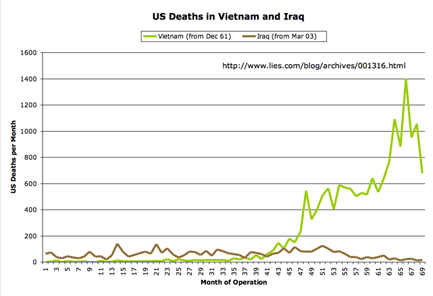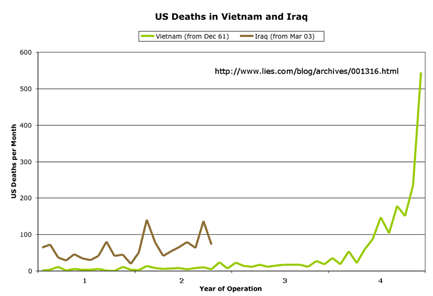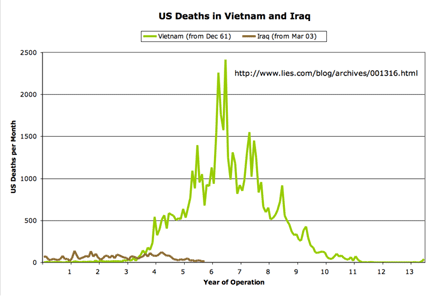Thirteen Months In
I’ve updated my Iraq-Vietnam comparison graphs with the numbers of US dead in Iraq during the month of March; see below. March’s numbers were up, sadly, as the people who were concentrating on killing Iraqis during February turned their sights (well, their improvised roadside bombs) back on us.
Again, I’m getting these figures from the advanced search tool at the Vietnam Veterans Memorial Fund site, and from Lunaville’s page on Iraq coalition casualties. The figures are for the number of US dead per month, without regard to whether the deaths were combat-related.
The first graph shows the first thirteen months of each war. (Click on any image for a larger version.)
Next, the same chart, with the Vietnam numbers extended out to cover the first four years of the war:
Finally, the chart that gives the US death toll for the entire Vietnam war:
Yes, I’m completely aware that we had fewer troops in-theater in the early stages of the Vietnam war than at comparable points in the Iraq war. If I were trying to make a comparison of the relative lethality of the two conflicts, normalized for troop levels, I’d be starting the Vietnam graph later, in 1965.
But I’m not looking at that. I’m looking at these wars from a political perspective, looking at how politicans deal with bodybags coming home. And since December of ’61 is the date of the US death that Lyndon Johnson subsequently identified as having been the first to occur in the cause of Vietnamese freedom, that’s when I chose to start the Vietnam graph.




June 9th, 2004 at 11:42 am
I would like to see deaths per capita for each war, meaning, deaths divided by number of troops in the war zone.
And then I would like to see the death rate for Iraq alligned with the equivalent troop deployment numbers – meaning, when we had 10k troops deployed in each theatre, what was the death rate. When we had 100k troops deployed in each theatre, what was the death rate, etc.
The vietnam war troops were deployed much more slowly, so comparison on a linear time scale wouldn’t be accurate.